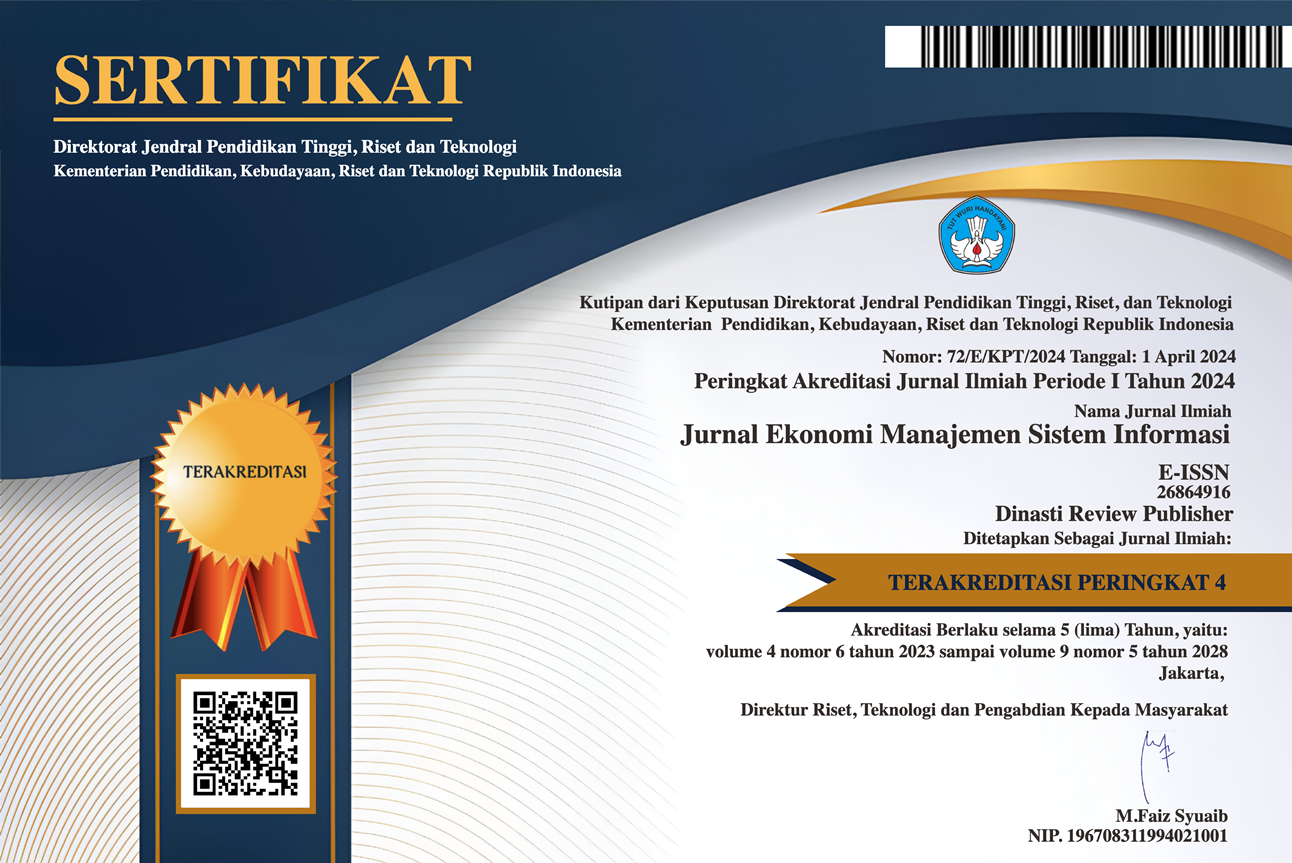Adaptasi Praktik Manajemen Sumber Daya Manusia dalam Lingkup Kerja Remote Work Pada Organisasi Internasional: Tantangan dan Strategi Terbaik
DOI:
https://doi.org/10.38035/jemsi.v6i2.3524Keywords:
Remote Work, HR Practice, IHRMAbstract
Terjadinya pergeseran budaya kerja menjadi kerja jarak jauh (Remote Work) telah membawa perubahan besar bagi sebuah organisasi di seluruh dunia. Praktik Remote Work berhasil memaksa organisasi untuk merubah sistem operasionalnya dengan memperkenalkan dinamika baru ke dalam manajemen tempat kerja. Literature review ini berusaha mengeksplorasi secara mendalam terkait tantangan apa saja yang dihadapi oleh manajemen sumber daya internasional serta mencoba memberikan gambaran terkait praktik terbaik untuk mendukung penerapan kerja jarak jauh dengan memperhatikan isu-isu terkini dalam pengelolaan manajemem sumber daya internasional. Tinjauan ini memadukan kerangka kerja teoritis dan studi relevan untuk menawarkan wawasan dalam menavigasi lanskap yang terus berkembang secara efektif yang diharapkan mampu menyediakan panduan komprehensif bagi para profesional SDM dalam mengelola tenaga kerja global dan kerja jarak jauh (Remote Work).
References
Adaramola, E. T. (2023). Communication Challenges and Strategies in Remote Work Settings. International Journal of Management, Social Sciences, Peace and Conflict Studies, 6(3), 75–86. https://www.researchgate.net/publication/377689012
Ali Khan, N., & Raghuvanshi, R. (2024). A Study of Performance Appraisal in Remote Work Environment. International Journal of Research Publication and Reviews Journal Homepage: Www.Ijrpr.Com ISSN, 5(4), 2319–2322. www.ijrpr.com
Arlington, V. (2020). Gartner HR Survey Reveals 88% of Organizations Have Encouraged or Required Employees to Work From Home Due to Coronavirus. https://www.gartner.com/en/newsroom/press-releases/2020-03-19-gartner-hr-survey-reveals-88--of-organizations-have-e
Atst?ja, L., R?t?tis, D., Deruma, S., & Aksjo?enko, E. (2021). Cyber Security Risks And Challenges In Remote Work Under The Covid-19 Pandemic. 12–22. https://doi.org/10.15405/epsbs.2021.12.04.2
Cebula, J. J., & Young, L. R. (2010). A Taxonomy of Operational Cyber Security Risks. Carnegie-Mellon Univ Pittsburgh Pa Software Engineering Inst, December, 1–47. https://doi.org/10.13140/RG.2.2.23973.91363
Costin, A., Roman, A. F., & Balica, R. S. (2023). Remote work burnout, professional job stress, and employee emotional exhaustion during the COVID-19 pandemic. Frontiers in Psychology, 14. https://doi.org/10.3389/fpsyg.2023.1193854
Deloitte. (2022). Global Remote Work Survey. Deloitte, April, 1–4. https://www.deloitte.com/global/en/services/tax/research/global-tax-remote-work-survey.html
Dhaniswari, N. M. P., & Sudarnice, S. (2024). Pengaruh Work-Life Balance dan Burnout terhadap Kinerja Karyawan Gen Z di Kota Denpasar. ASSET: Jurnal Manajemen Dan Bisnis, 7(1), 53–62. https://doi.org/10.24269/asset.v7i1.8910
ECI. (2021). Addressing Ethics & Compliance Challenges for Multinational Organizations. Ethics.Org, July.
Haan, K., & Main, K. (2024). Remote Work Statistics And Trends In 2024. https://www.forbes.com/advisor/in/business/remote-work-statistics/#:~:text=69%25 of remote workers report,burnout from digital communication tools.
Haque, S. M. S. (2023). the Impact of Remote Work on Hr Practices: Navigating Challenges, Embracing Opportunities. European Journal of Human Resource Management Studies, 7(1), 56–84. https://doi.org/10.46827/ejhrms.v7i1.1549
Harshitha. Arul Senthil. (2019). Impact of Employee Motivation on Organizational Performance. International Journal of Advanced Research, 7(10), 166–172. https://doi.org/10.21474/ijar01/9818
Hipp, L., & Krzywdzinski, M. (2023). Remote Work: New Fields and Challenges for Labor Activism. Work and Occupations, 50(3), 445–451. https://doi.org/10.1177/07308884231163135
Huumonen, J., Poranen, T., & Zhang, Z. (2022). Communication Challenges in Distributed Student Projects. SEFI 2022 - 50th Annual Conference of the European Society for Engineering Education, Proceedings, 334–343. https://doi.org/10.5821/conference-9788412322262.1225
Kukyt?, A. (2023). Managers’ Strategies to Support Employee Well-Being in Remote Work Environment. Vilnius University Proceedings, 37, 48–53. https://doi.org/10.15388/vgisc.2023.7
Lippe, T., & Zoltán Lippényi. (2020). Co-workers working from home and individual and team performance. New Technology, Work and Employment, 35(1), 1–144. https://doi.org/10.1111/ntwe.12153
Luyiggo, A. E. (2024). Exploring Leadership Styles in Remote Work Environments?: A qualitative Exploring Leadership Styles in Remote Work Environments?: A qualitative inquiry. June.
Mahesh, D. (2024). Remote Work: Challenges and strategies for Effective Management. Shanlax International Journal of Management, 11(iS1-Jan), 145–149. https://doi.org/10.34293/management.v11iis1-jan.7156
Orr, A., & Savage, T. (2021). Expanding Access to and Ensuring Equity in the Benefits of Remote Work Following the COVID-19 Pandemic. Journal of Science Policy & Governance, 18(04). https://doi.org/10.38126/jspg180413
Paul, R., John R. Drake, & Huigang Liang. (2016). Global Virtual Team Performance: The Effect of Coordination Effectiveness, Trust, and Team Cohesion. IEEE Transactions on Professional Communication, 59(3), 186–202. https://ieeexplore.ieee.org/abstract/document/7552617
Pradana, A. W., & Perkasa, D. H. (2024). International HR Management?: Managing the Global Workforce with Knowledge Management. 01(06), 226–231.
Quibria, M. G., Ahmed, S. N., Tschang, T., & Reyes-Macasaquit, M. L. (2002). Digital divide: Determinants and policies with special reference to Asia. ERD Working Paper Series, 27, 1–16.
Rarung, N., Maramis, J. B., Saerang, D. P. E., Dotulong, L. O. H., & Soepeno, D. (2022). MAKNA WORK FROM HOME PADA PEGAWAI NEGERI SIPIL (Studi Fenomenologi pada Pegawai Negeri Sipil Kanwil DJKN Sulawesi Utara, Tengah, Gorontalo dan Maluku Utara). Jurnal EMBA?: Jurnal Riset Ekonomi, Manajemen, Bisnis Dan Akuntansi, 10(2), 1022–1033. https://doi.org/10.35794/emba.v10i2.41276
Roberto, R., Zini, A., Felici, B., Rao, M., & Noussan, M. (2023). Potential Benefits of Remote Working on Urban Mobility and Related Environmental Impacts: Results from a Case Study in Italy. Applied Sciences (Switzerland), 13(1). https://doi.org/10.3390/app13010607
Rufeng, L., Nan, Z., & Jianqiang, Z. (2023). Impact of Employee Well-Being on Organizational Performance in Workplace. Int. J. Mgmt. Hum. Sci, 7(2), 87–95. https://doi.org/10.31674/ijmhs.2023.v07i02.010www.ijmhs.org
Sabrina Wulff, P., & Jill Janocha Redmond. (2024). The rise in remote work since the pandemic and its impact on productivity. U.S Bureau of Labor Statistics. https://www.bls.gov/opub/btn/volume-13/remote-work-productivity.htm
Sari, M. (2020). NATURAL SCIENCE?: Jurnal Penelitian Bidang IPA dan Pendidikan IPA , ISSN?: 2715-470X ( Online ), 2477 – 6181 ( Cetak ) Penelitian Kepustakaan ( Library Research ) dalam Penelitian Pendidikan IPA. 41–53.
Downloads
Published
How to Cite
Issue
Section
License
Copyright (c) 2024 Silvi Wira Uswatun Hasanah, Didin Hikmah Perkasa

This work is licensed under a Creative Commons Attribution 4.0 International License.
Hak cipta :
Penulis yang mempublikasikan manuskripnya di jurnal ini menyetujui ketentuan berikut:
- Hak cipta pada setiap artikel adalah milik penulis.
- Penulis mengakui bahwa Jurnal Ekonomi Manajemen Sistem Informasi (JEMSI) berhak menjadi yang pertama menerbitkan dengan lisensi Creative Commons Attribution 4.0 International (Attribution 4.0 International CC BY 4.0) .
- Penulis dapat mengirimkan artikel secara terpisah, mengatur distribusi non-eksklusif manuskrip yang telah diterbitkan dalam jurnal ini ke versi lain (misalnya, dikirim ke repositori institusi penulis, publikasi ke dalam buku, dll.), dengan mengakui bahwa manuskrip telah diterbitkan pertama kali di Jurnal Ekonomi Manajemen Sistem Informasi (JEMSI).










































































